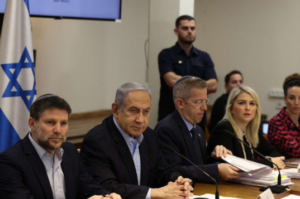The Complex Landscape of US-Israel Relations: Money, Power, and the Plight of Gaza
At Extreme Investor Network, we believe that a thorough understanding of political economics is crucial for making informed investment decisions. Today, we’re diving deep into the intricate web of US foreign policy, aid to Israel, and the ongoing humanitarian crisis in Gaza—a topic less discussed in conventional financial analyses, yet of immense importance for investors considering geopolitical risks.
The Financial Backbone of US-Israel Relations
It’s widely acknowledged that U.S. financial support for Israel is substantial, amounting to over $30 billion since the early 2000s. A significant portion of this aid, approximately $12 billion, was allocated during the Trump administration, illustrating a bipartisan commitment to Israel as a strategic ally. Yet, amidst this overwhelming support, there are voices of dissent.
Interestingly, a handful of Democratic lawmakers—fifteen to be precise—stood against the continued funding for Israel’s military operations in Palestine. While their voices may seem small in the grand scheme of U.S. foreign policy, they represent a growing awareness of the need for a balanced approach in global investments and diplomatic relations.

The Humanitarian Crisis in Gaza: A Growing Concern
Diving deeper into the reality on the ground, the situation in Gaza paints a grim picture. Two-thirds of the territory has been declared a “no-go” zone, rendering options for escape nearly nonexistent. As of early March 2023, essential aid to Gaza was entirely blocked, leading to skyrocketing food prices—an astounding 450% increase. With basic necessities becoming scarce, it’s crucial to understand this crisis not just as a humanitarian issue, but as a political and economic one that can ripple through global markets.
Economic Consequences of Blockade
The ramifications of the blockade go beyond immediate suffering. They jeopardize long-term economic stability in the region, which could have broader implications for Middle Eastern economies. With reports indicating that 66% of Gaza’s households have lost access to water and over 89,000 tons of food rotting at the borders, the economic landscape looks bleak.
This situation could lead to heightened tensions and conflict in the region, affecting oil prices, investment opportunities, and altering the risk profile for investors—including those in sectors dependent on stability in the Middle East.
The Classification of Genocide: A Legal Perspective
The ongoing crisis raises serious ethical and legal questions, falling within the definitions set out in Article II of the Genocide Convention. That document outlines acts that could constitute genocide, including deliberately inflicting conditions calculated to bring about the group’s physical destruction.
As investors, we must evaluate not only the immediate political implications but also the long-term effects of such classifications on international relations and global markets. Understanding this complexity allows for a more nuanced view of risk assessment in geopolitical investments.
Rising Tensions: The Broader Middle Eastern Theater
The U.S. is reportedly establishing one of the largest military bases in Lebanon, aimed at countering Hezbollah, further complicating the regional dynamics. This aligns with the ongoing uncertainty surrounding Hamas’s recent military maneuvers, especially regarding their breach of Israel’s Iron Dome defenses.
For investors, acknowledging the shifting allegiances and military developments in the region is crucial. Whether you’re already invested in Middle Eastern markets or contemplating entry, comprehending these dynamics can provide essential insights into potential volatility ahead.
Conclusion: Finding Your Footing in an Uncertain Landscape
While major financial media often focus solely on numbers, it’s the stories behind these figures—like those in Gaza—that reveal the intricacies of the global economy. Political decisions and humanitarian crises are undeniably intertwined with financial outcomes.
At Extreme Investor Network, we strive to provide our readers with the expertise to navigate these complexities. Keeping informed about geopolitical developments not only enriches your understanding but can also significantly influence your investment strategies.
Stay tuned for more insights and analyses that empower you to make informed decisions in a rapidly changing world.

